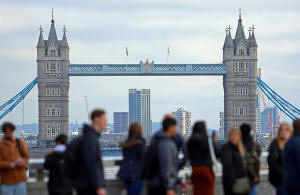UK wage growth slows again but BoE likely to remain on alert
 Send a link to a friend
Send a link to a friend
 [February 13, 2024] By
William Schomberg and Suban Abdulla [February 13, 2024] By
William Schomberg and Suban Abdulla
LONDON (Reuters) -British pay grew at the weakest pace in more than a
year at the end of 2023 but the slowdown was probably not significant
enough to spur the Bank of England into quicker action towards cutting
interest rates.
Sterling strengthened against the U.S. dollar and the euro and investors
slightly scaled back their bets on BoE rate cuts in 2024.
Wages excluding bonuses grew by 6.2% in the last three months of 2023
compared with the same period a year earlier, the Office for National
Statistics said.
That was down from 6.7% in the three months to November and represented
the slowest increase since the three months to October 2022, but
exceeded a median forecast of 6.0% in a Reuters poll of analysts.
Britain's economy may have fallen into a shallow recession in the second
half of 2023, something official data is expected to confirm on
Thursday, but the labor market remains tight as businesses struggle to
find and retain staff. High levels of long-term sickness are also
hampering employers.
Including bonuses, which can be volatile, pay growth slowed to 5.8% from
6.7% in the three months to November, the smallest increase since the
three months to July 2022 but above the Reuters poll forecast of 5.6%.
Jake Finney, an economist at PwC UK, said the latest fall in vacancies
showed that the heat was coming out of the labour market and pay growth
was continuing to slow.

Vacancies fell for the 19th time in a row in the three months to
January, dropping by 26,000 from the August-to-October period but were
only 2,000 lower than in the three months to December.
“The lingering concern for the Bank of England will be that the labor
market has not cooled sufficiently to achieve a sustainable return to
the 2% inflation target," Finney said.
'NO URGENT NEED' FOR RATE CUTS
Regular pay in the private sector rose by an annual 6.2% in the fourth
quarter, stronger than the BoE's forecast of 6.0% that it published
earlier this month.
The BoE is worried that pay might continue to rise too quickly for
inflation to fall to its 2% target.
[to top of second column] |

People walk over London Bridge looking at a view of Tower Bridge in
the City of London financial district in London, Britain, October
25, 2023. REUTERS/ Susannah Ireland/File Photo

Data due on Wednesday is expected to show inflation edged up to 4.2%
in January. It is forecast to sink back to 2% in the second quarter
before picking up again later this year.
Elizabeth Martins, an economist with HSBC, said the conflicting
signals from the labor market helped to explain the three-way split
on the BoE's Monetary Policy Committee this month with two members
voting to raise rates, one to cut and six to keep them on hold.
"Our own view is that the UK economy is in no urgent need of
monetary support, and these data back that up," she said, predicting
a first rate cut in August.
At 1030 GMT, investors were putting a 62% chance on a first BoE rate
hike in June, down from 75% on Monday, and were fully pricing in a
cut by August.
Tuesday's data showed the jobless rate fell to 3.8% between October
and December and employment rose by 72,000 people.
The ONS has reweighted those data sets to account for changes in
population estimates, but a full overhaul of its Labor Force Survey
will only take place in September.
There have been other signs that Britain's jobs market is gradually
coming off the boil.
Employers plan the first drop in nearly four years in the pace of
pay rises over the coming 12 months, a survey showed on Monday,
echoing a similar set of data last week.
Workers saw the biggest increase in their regular earnings adjusted
for consumer price inflation since the three months to September
2021, with a rise of 1.9% on an annual basis.
However, British households are on course to suffer a first decline
in living standards over the course of a parliament since World War
Two, a tough backdrop for Prime Minister Rishi Sunak who is expected
to call a national election in late 2024.
(Reporting by William Schomberg and Suban Abdulla; editing by Kate
Holton, Andrew Heavens and Bernadette Baum)
[© 2024 Thomson Reuters. All rights
reserved.]
This material may not be published,
broadcast, rewritten or redistributed.
Thompson Reuters is solely responsible for this content. |